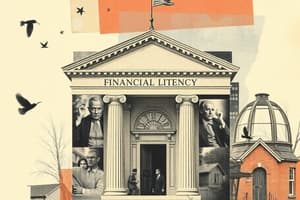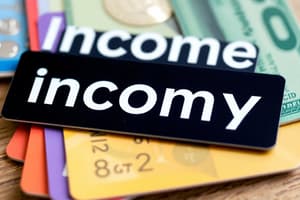Podcast
Questions and Answers
Which component is NOT included in the definition of traditional literacy?
Which component is NOT included in the definition of traditional literacy?
- Critical Thinking
- Reading
- Phonemic Awareness (correct)
- Listening and Speaking
What is a key difference between functional literacy and traditional literacy?
What is a key difference between functional literacy and traditional literacy?
- Functional literacy focuses on social interactions.
- Traditional literacy includes completing forms and applications.
- Traditional literacy is solely about reading comprehension.
- Functional literacy involves applying skills in real-life situations. (correct)
Which of the following can be classified as a pre-reading activity?
Which of the following can be classified as a pre-reading activity?
- Reading comprehension tests
- Writing essays
- Storytelling and rhyming (correct)
- Understanding instruction manuals
What does print awareness involve in the context of early literacy?
What does print awareness involve in the context of early literacy?
Why is traditional literacy considered a prerequisite for acquiring advanced skills?
Why is traditional literacy considered a prerequisite for acquiring advanced skills?
Which skill is NOT specifically associated with functional literacy?
Which skill is NOT specifically associated with functional literacy?
What is the main goal of early literacy development?
What is the main goal of early literacy development?
What aspect does traditional literacy NOT empower individuals to do?
What aspect does traditional literacy NOT empower individuals to do?
How does project-based learning primarily enhance students' understanding?
How does project-based learning primarily enhance students' understanding?
What is a key characteristic of student-centered learning?
What is a key characteristic of student-centered learning?
Which of the following best describes the importance of 21st-century skills?
Which of the following best describes the importance of 21st-century skills?
What strategy is NOT effective for developing literacy skills?
What strategy is NOT effective for developing literacy skills?
What is a primary objective of incorporating technology in education?
What is a primary objective of incorporating technology in education?
Which of the following is a feature of global classrooms?
Which of the following is a feature of global classrooms?
Which literacy skill involves analyzing media content critically?
Which literacy skill involves analyzing media content critically?
What does the strategy of synthesizing involve in literacy development?
What does the strategy of synthesizing involve in literacy development?
Which literacy type focuses on understanding diverse cultures and fostering empathy?
Which literacy type focuses on understanding diverse cultures and fostering empathy?
What is the primary focus of social literacy?
What is the primary focus of social literacy?
Which form of literacy emphasizes self-expression through various art forms?
Which form of literacy emphasizes self-expression through various art forms?
Which literacy enables individuals to make informed decisions regarding money management?
Which literacy enables individuals to make informed decisions regarding money management?
What does eco-literacy specifically address?
What does eco-literacy specifically address?
Which of the following best describes media literacy?
Which of the following best describes media literacy?
What is a key attribute of 21st-century education?
What is a key attribute of 21st-century education?
Which statement about basic literacy is true?
Which statement about basic literacy is true?
Flashcards are hidden until you start studying
Study Notes
Traditional Literacy
- Defined as the ability to read, write, and comprehend text.
- Core components include reading, writing, listening, speaking, and critical thinking.
- Serves as a foundation for further learning and societal participation.
Functional Literacy
- Extends beyond basic reading and writing to encompass practical application in daily life.
- Examples include understanding instructions, completing forms, and engaging with information in various contexts.
- Crucial for navigating daily tasks, making informed decisions, and enhancing employability.
Early/Emergent Literacy
- Encompasses skills children develop before independent reading and writing.
- Key elements are phonemic awareness, vocabulary development, and print awareness.
- Develops through pre-reading (e.g., storytelling) and early reading stages.
- Crucial for later academic success.
Basic Literacy and Skills
- Includes fundamental reading, writing, and basic arithmetic skills.
- Essential for functioning in society, securing employment, and community engagement.
- Typically taught in early education but can be developed through adult programs.
21st-Century Literacies and Skills
- Globalization and Multicultural Literacy: Understanding diverse cultures and global issues.
- Social Literacy: Effective engagement in social contexts, understanding social cues and norms.
- Media Literacy: Critical analysis of media messages and responsible content creation.
- Financial Literacy: Understanding financial concepts like budgeting, saving, and investing.
- Cyber/Digital Literacy: Effective use of digital technologies while ensuring online safety.
- Eco-Literacy: Understanding ecological principles and promoting sustainable practices.
- Arts and Creativity Literacy: Using creativity for problem-solving and self-expression.
Critical Attributes of 21st-Century Education
- Integrated and interdisciplinary curriculum.
- Use of technology and multimedia for enhanced learning.
- Global classroom perspectives and cross-cultural collaboration.
- Focus on adapting to change and continuous personal growth.
- Student-centered learning that addresses individual needs.
- Emphasis on 21st-century skills (critical thinking, collaboration, communication, creativity).
- Project-based and research-driven learning experiences.
- Relevant, rigorous, real-world learning applications.
Basic Strategies for Developing Literacy
- Making connections between new and existing knowledge.
- Using visualization to enhance understanding.
- Inferring meaning from context clues.
- Asking questions to foster curiosity.
- Determining the importance of key ideas.
- Synthesizing information from multiple sources.
21st-Century Skill Categories
- Learning Skills: Critical thinking, creativity, collaboration, communication.
- Literacy Skills: Information literacy, media literacy, technology literacy.
- Life Skills: (Specific skills not listed).
Studying That Suits You
Use AI to generate personalized quizzes and flashcards to suit your learning preferences.




